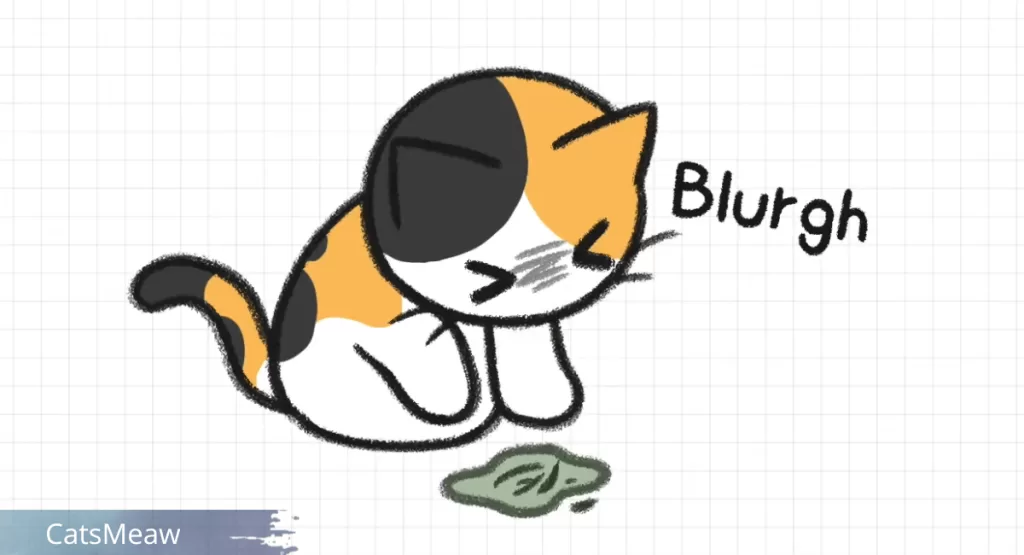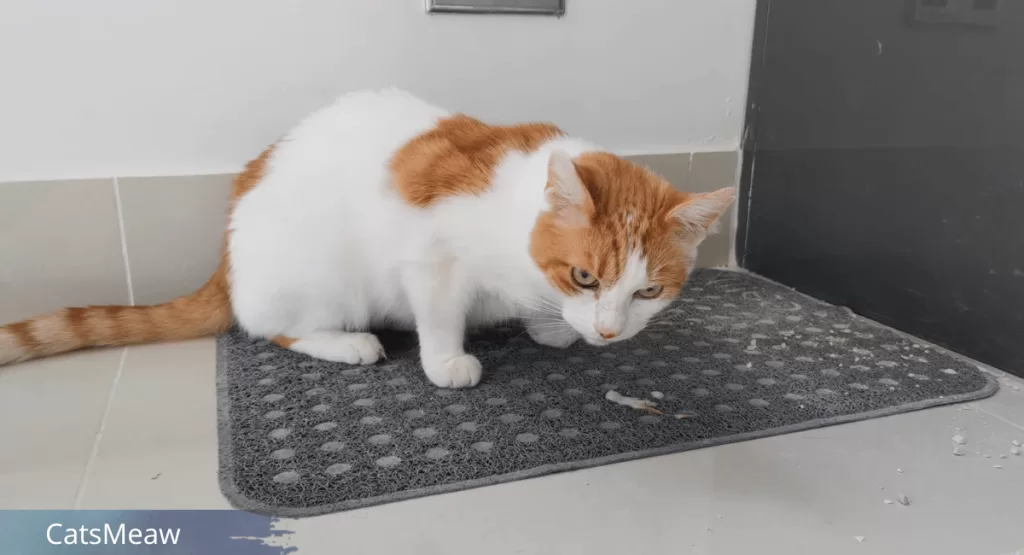Vomiting is a common occurrence in cats and can be caused by a variety of factors. It is important for cat owners to understand the causes behind this behavior in order to effectively treat and manage it. Vomiting in cats is the forceful expulsion of stomach contents through the mouth and is different from regurgitation, which is the passive release of undigested food.

Cats have a sensitive digestive system, and vomiting can be a sign of an underlying issue. It is important to note that occasional vomiting may be normal for cats, especially if they have ingested something that doesn’t agree with their stomach. However, if cat throwing up becomes frequent or is accompanied by other concerning symptoms as bloody diarrhea, it is essential to seek veterinary help.
Table of Contents
Common causes of vomiting in cats
There are several common causes of vomiting in cats, ranging from mild to more serious conditions. Some of the primary causes include:
- Dietary indiscretion: Cats are curious creatures and may ingest non-food items, such as plants, hairballs, or foreign objects. This can irritate their digestive system and lead to vomiting.
- Food intolerance/allergies: Some cats may have allergies or intolerances to certain ingredients in their food. This can trigger an immune response, leading to vomiting.
- Gastrointestinal obstruction: If a cat swallows a large object or has a blockage in their digestive tract, it can cause severe vomiting. This is a medical emergency and requires immediate veterinary attention.
- Infections and parasites: Viral, bacterial, or parasitic infections can cause vomiting in cats. Common culprits include feline panleukopenia virus, feline leukemia virus, and giardia.
- Organ dysfunction: Cats with underlying kidney, liver, or thyroid problems may experience vomiting as a symptom of their condition.
When to seek veterinary help for cat vomiting
While occasional cat throwing up may not be cause for concern, certain signs indicate when it is necessary to seek veterinary help. If your cat exhibits any of the following symptoms, it is recommended to consult with a veterinarian:
- Frequent vomiting: If your cat is vomiting more than once a day or on a regular basis, it is a cause for concern.
- Bloody or coffee ground-like vomit: Vomit that contains blood or resembles coffee grounds may indicate internal bleeding and requires immediate veterinary attention.
- Lethargy and loss of appetite: If your cat is vomiting and also displaying signs of lethargy and loss of appetite, it could be a sign of a serious underlying condition.
- Abdominal pain: Cats experiencing abdominal discomfort, restlessness, or discomfort when touched may be suffering from an obstruction or other serious issue.
Treatment options for cat vomiting
The treatment for cat throwing up depends on the underlying cause. When you visit a veterinarian, he will perform a thorough examination and may recommend the following treatment options:
- Fluid therapy: If your cat is dehydrated due to vomiting, the veterinarian may administer fluids to restore hydration and electrolyte balance.
- Medications: In some cases, medications such as antiemetics may be prescribed to reduce nausea and cat throwing up.
- Dietary changes: Your veterinarian may suggest a temporary diet change to a bland or easily digestible food to give your cat’s stomach a break and promote healing.
- Treatment for underlying conditions: If the vomiting is a symptom of an underlying disease or condition, such as kidney disease or pancreatitis, the veterinarian will develop a treatment plan to address the specific issue.
Related: Cat Not Eating: Causes & Treatments

Home remedies for managing cat vomiting
While it is important to check up with a vet for proper diagnosis and treatment, there are some home remedies that may help manage cat vomiting:
- Fasting: With guidance from your veterinarian, fasting your cat for a short period can allow their stomach to rest and recover. However, it is crucial to ensure they have access to water during this time.
- Small, frequent meals: Once your cat’s vomiting has subsided, gradually reintroduce small, frequent meals to prevent overwhelming their digestive system.
- Hairball prevention: Regular brushing can help reduce the amount of hair your cat ingests during grooming, decreasing the likelihood of hairball-related vomiting.
- Stress reduction: Cats can vomit due to stress or anxiety. Providing a calm and safe environment, along with interactive toys and playtime, can help reduce stress-induced vomiting.
Preventing cat vomiting with dietary changes
Diet plays an important role in preventing cat throwing up. Here are some dietary changes that can help reduce the occurrence of vomiting:
- High quality, balanced diet: Feed your cat a balanced and high quality diet that meets their nutritional requirements. Avoid feeding them low-quality or expired food, as it can lead to stomach upset.
- Avoid sudden diet changes: Gradually introduce new foods to your cat’s diet to prevent gastrointestinal upset. Abrupt changes in diet can trigger vomiting.
- Food sensitivity testing: If your cat has frequent vomiting episodes, your veterinarian may suggest food sensitivity testing to identify any potential allergies or intolerances.
- Hairball control: Hairballs can be a common cause of cat throwing up. Regular grooming and the use of hairball control products can help prevent hairball-related vomiting.
Tips for reducing stress-induced vomiting in cats
Stress and anxiety can trigger vomiting in cats. To help reduce stress-induced vomiting, consider the following tips:
- Provide a safe space: Create a designated area in your home where your cat can retreat to when they feel stressed or overwhelmed. This can be a quiet room with their bed, toys, and a litter box.
- Routine and consistency: Cats thrive on routine and familiarity. Maintain a consistent daily routine for feeding, playtime, and social interaction to help reduce stress.
- Interactive play: Engage your cat in interactive play sessions to provide mental and physical stimulation. This can help reduce anxiety and stress.
- Use of pheromone products: Feliway, a synthetic feline facial pheromone, can help create a calming environment for your cat and reduce stress-related behaviors, including vomiting.
Conclusion: Taking care of your cat’s digestive health
cat throwing up can be a distressing experience for both the cat and their owner. By understanding the causes of vomiting and seeking veterinary help when necessary, you can effectively manage and treat this issue.
Remember to provide a calm and stress-free environment for your cat, ensure they have a balanced diet, and consult with a veterinarian for any concerns or questions. Taking care of your cat’s digestive health will contribute to their overall well-being and happiness.
